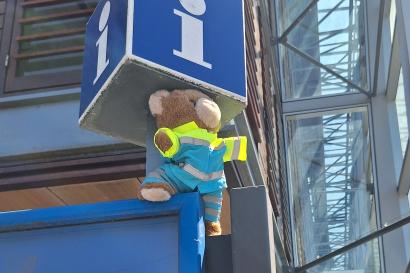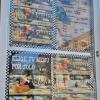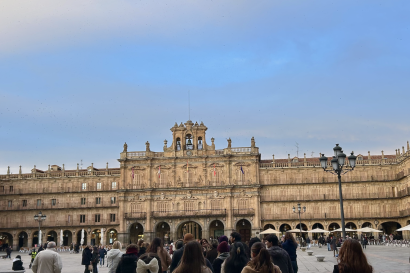Being Mexican and having Spanish as my first language gave me an advantage when I was deciding which Spanish speaking countries to study in. I decided to come to Spain not just because I knew the spoken language but because I wanted to learn the language more academically. This was especially helpful as I am a Spanish major, and the courses offered in the program this semester were very interesting. I also decided on the program in Salamanca because of the wise advice of three people: my advisor and two upperclassmen friends. My advisor did his study abroad in Salamanca many years ago, while my friends studied in this exact program recently. Their praise and nostalgia for the city convinced me to come here. Since being here, I have been immersed in the Spanish culture in a wonderful way.
While I’ve been here, I have picked up some Spain words and lingo. However, like most Hispanic parents and friends might be relieved to know I have not picked up the Spanish accent. I have instead picked up on gestures. Hand gestures are very used in Spain especially in the club atmosphere or when you want to talk to someone in secret. Being Mexican where people use their hands a lot while talking it was not new for me to see hand gesture. However, I did have to ask what they meant and since then I have used them myself a few times. So even though I haven’t picked up on using “vosotros” or the verb ending -ais, I have learned new things.
Although I speak Spanish fluently, I have been called out by Spaniards for my vocabulary or accent. Sometimes while I pay at the cashier or at a restaurant I’m asked “¿Eres Mexicano?” and I happily say yes. However, it does make me wonder; what gave it away, when I’ve only said a few words? Is it my appearance, do I have a noticeable accent, did I say a word differently or respond with a more Mexican response? For example, I didn’t hear a question and responded “¿Mande?” and I immediately got asked if I was Mexican. I asked a Spanish friend later and she told me she says “¿Perdon?” Despite that, I still appreciate that they ask out of curiosity. Especially since Salamanca has many study-abroad students from different countries and tourists, it makes sense that places wonder where people came from.
But I and other native speakers have had some negative experiences. From being sexualized to having people wonder why we are studying here and not a different Spanish speaking country or why I am studying Spanish when I am a native speaker. As many people know, some accents are seen as charming or hot. This is especially true for people that are not in diverse groups or do not travel much. However, this causes issues for study-abroad students as they may not know how to handle these situations.
In the end, although I have had mixed reactions and experiences while studying abroad here, I have enjoyed my time. I have taken great pride in my Mexican heritage and used it to my advantage and mixed it in with my daily life living in Spain. From using “palabrotoas” (curse words) from Mexico and Spain when my train has a big delay to using slang words when I see something “guay” (cool) or “cuqui” (cute). I have learned a lot through friends, other study abroad students, and just living in a different place.

Raine Botello
I am a Mexican, Queer, Posse scholar. I am very excited to study abroad and open to all the experience I will have. From good to bad, I am ready for the challenges that await and am ready to share my experiences.







